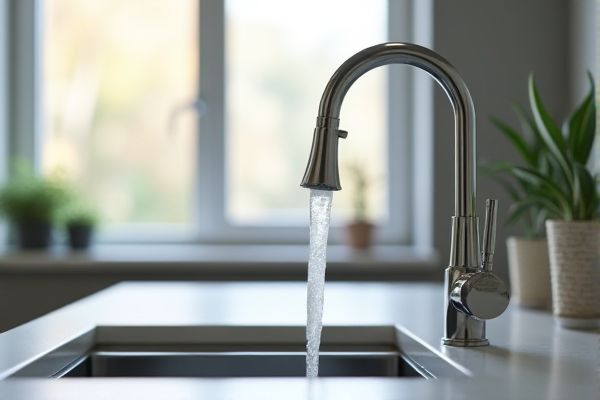
A water filter faucet removes impurities and contaminants to provide safer, cleaner drinking water, unlike a standard faucet that only delivers untreated tap water. Discover how choosing the right faucet can improve Your water quality and health by reading the rest of the article.
Table of Comparison
| Feature | Water Filter Faucet | Standard Faucet |
|---|---|---|
| Function | Filters water to remove contaminants and improve taste | Delivers unfiltered tap water |
| Water Quality | Clean, purified water with reduced chlorine, lead, and sediments | Regular tap water, may contain impurities |
| Installation | Requires connection to filtration system or cartridge | Simple plumbing fixture installation |
| Maintenance | Regular filter cartridge replacement needed | Minimal maintenance, occasional cleaning |
| Cost | Higher initial cost plus ongoing filter expenses | Lower initial cost, minimal ongoing expenses |
| Water Flow | May have reduced flow rate due to filtration | Full water flow without restriction |
| Health Benefits | Reduces harmful substances, improves drinking water safety | No filtration; does not improve water safety |
| Lifespan | Depends on filter quality and usage; filters need replacement | Long-lasting with proper care |
Introduction to Water Filter Faucets vs Standard Faucets
Water filter faucets integrate advanced filtration systems designed to remove contaminants such as chlorine, lead, and sediments, providing cleaner and safer drinking water directly from the tap. Standard faucets lack built-in filtration, delivering unfiltered municipal or well water that may contain impurities affecting taste and quality. Choosing a water filter faucet enhances water purity and health benefits without the need for separate filtration devices.
Key Differences Between Water Filter and Standard Faucets
Water filter faucets incorporate built-in filtration systems that remove contaminants such as chlorine, lead, and sediments, providing cleaner and safer drinking water compared to standard faucets, which simply deliver unfiltered tap water. The design of water filter faucets often includes specialized cartridges requiring periodic replacement to maintain purification efficiency, while standard faucets have minimal maintenance needs but offer no water treatment. Installation for water filter faucets may involve additional plumbing modifications or dedicated spouts, distinguishing them from the simpler setup of standard faucets that connect directly to the main water supply.
Benefits of Using a Water Filter Faucet
A water filter faucet provides purified, contaminant-free water directly at the tap, enhancing taste and safety compared to standard faucets. It reduces exposure to harmful substances such as chlorine, lead, and bacteria, promoting better health for users. Installing a water filter faucet also helps save money by decreasing reliance on bottled water and minimizing maintenance costs related to plumbing issues caused by sediment buildup.
Limitations of Standard Faucets for Drinking Water
Standard faucets often lack built-in filtration, leading to potential contaminants such as chlorine, heavy metals, and sediments directly entering the drinking water. These faucets do not remove impurities affecting taste, odor, and safety, increasing reliance on external filtration systems or bottled water. Consequently, standard faucets may pose health risks and fail to meet water quality standards desired for safe consumption.
Installation Process: Filtered vs Standard Faucets
Installing a water filter faucet typically involves connecting the faucet to the existing plumbing and integrating a filtration system, which may require additional tools and time compared to a standard faucet. Standard faucet installation is generally straightforward, focusing solely on securing the faucet to the sink and connecting it to the water supply without extra filtration components. The complexity of installing filtered faucets varies based on the filter type, with under-sink models demanding more precise fitting and occasional cartridge replacements.
Cost Comparison: Water Filter Faucet vs Standard Faucet
Water filter faucets typically cost between $50 and $200, reflecting the advanced filtration technology integrated into their design, while standard faucets generally range from $20 to $100 depending on the material and style. Installation costs for water filter faucets can be higher due to additional plumbing requirements, often adding $100 to $300 compared to simpler setups for standard faucets. Long-term expenses for water filter faucets may include replacement filters costing $20 to $60 every few months, which are not a factor with standard faucets, making overall lifetime costs higher despite the benefits of purified water.
Maintenance and Longevity: Which Faucet Lasts Longer?
Water filter faucets typically require more frequent maintenance due to regular filter replacements and cleaning to prevent clogging and ensure water purity. Standard faucets generally have a longer lifespan with minimal upkeep since they lack filtration components prone to wear and tear. The longevity of water filter faucets depends on consistent filter care, while standard faucets benefit from simpler, durable designs.
Water Quality and Health Impact
Water filter faucets significantly improve water quality by removing contaminants such as chlorine, heavy metals, and bacteria, reducing potential health risks associated with contaminated tap water. Standard faucets provide unfiltered water that may contain impurities affecting taste and posing long-term health concerns like gastrointestinal issues. Choosing a water filter faucet enhances your access to clean, safer drinking water, promoting better overall health.
Environmental Considerations and Sustainability
Water filter faucets significantly reduce plastic waste by minimizing the need for bottled water, promoting environmental sustainability through decreased plastic consumption. Standard faucets, while convenient, often lead to higher energy and water usage due to less efficient filtration systems, impacting resource conservation efforts negatively. Choosing a water filter faucet supports your commitment to eco-friendly living by enhancing water quality while conserving natural resources.
Choosing the Best Faucet for Your Home
Water filter faucets provide purified drinking water directly from the tap, enhancing health by reducing contaminants like chlorine, lead, and sediment. Standard faucets deliver untreated water suitable for general household use, but lack filtration capabilities. Selecting the best faucet depends on your water quality concerns, filtration needs, and budget, with water filter faucets ideal for clean, safe drinking water and standard faucets fitting basic water access requirements.
 homyna.com
homyna.com